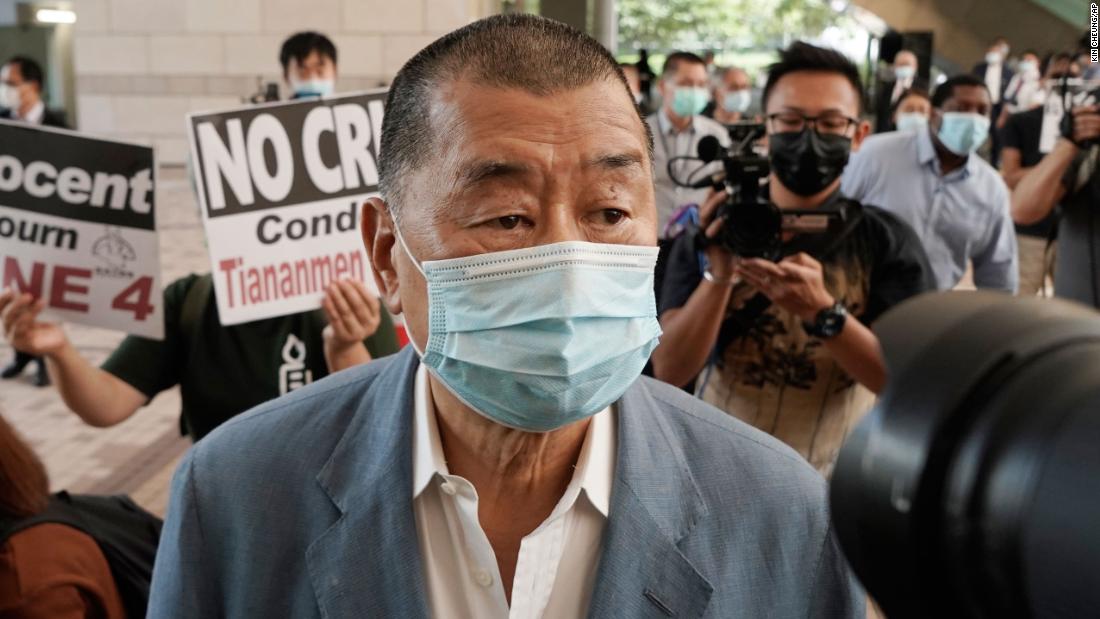
Lai, 73, who is known for his support of the city's democracy movement and criticism of mainland China, was charged on suspicion of colluding with foreign forces and endangering national security, according to Hong Kong police.
He is the most high-profile person to be charged under the law, which was imposed by Beijing in June. The offense of colluding with foreign powers carries a maximum penalty of life imprisonment.
Lai was arrested in August, on the same day that about 200 officers raided the newsroom of his pro-democracy tabloid Apple Daily, and seized scores of boxes of documents.
Speaking to CNN at his home in Kowloon in August, Lai said his arrest was a "symbolic exercise" by local authorities to demonstrate the sweeping national security law imposed by Beijing had "teeth."
"There is always a price to pay. I have been fighting (for democracy) throughout the years," he said, adding that he would continue to do so because "without freedom you have nothing left."
Earlier this month, Lai was denied bail following an arrest on separate charges of fraud. He has been in custody since then.
Lai is revered by many as a standard-bearer of the Hong Kong democracy movement. But others have long accused him of being an agent for the United States, due to his strong ties to Washington. Lai has lobbied for the US to take a harder line on China, but said in August he had not done this in person since the law passed on June 30.
Lai dismissed the accusations against him as "not very serious," saying that evidence presented to him by officers during his 40 hours in custody after being arrested included television interviews with international media, in which he called for China to be sanctioned.
Under the national security law, this could be interpreted as collusion with a foreign force.
Lai also said he did not back the Hong Kong independence movement, although he supported people's freedom to call for it, and denied long-standing rumors that he used money from the US to subvert China.
The Hong Kong government has defended the law as necessary to bring peace and order to the city. It has been denounced by human rights groups, the European Union, and the United States as overly broad and restrictive of the city's civil liberties.
When the law was passed, Hong Kong leader Carrie Lam said it would only target "an extremely small minority of offenders, while the life and property as well as various legitimate basic rights and freedoms enjoyed by the overwhelming majority of citizens will be protected."
At least two dozen people have been arrested on a variety of charges including suspicion of violating the national security law, including one of Lai's sons. What they have done to contravene the law since it took effect is unclear.
It comes after three high-profile activists were jailed on December 2, for involvement in protests during months of unrest in Hong Kong last year over a proposed extradition bill with China.
Joshua Wong was sentenced to 13.5 months in prison after pleading guilty to inciting and organizing an unauthorized protest outside the city's police headquarters on June 21, 2019.
Two other activists, Agnes Chow and Ivan Lam, were sentenced to 10 months and seven months in prison, respectively, over the protest. Chow faced charges relating to inciting and taking part in the protest, while Lam was charged with inciting the protest.
World - Latest - Google News
December 11, 2020 at 05:04PM
https://ift.tt/345dEdb
Hong Kong media tycoon Jimmy Lai charged under national security law - CNN
World - Latest - Google News
https://ift.tt/2SeTG7d
https://ift.tt/35oCZy1
Bagikan Berita Ini














0 Response to "Hong Kong media tycoon Jimmy Lai charged under national security law - CNN"
Post a Comment